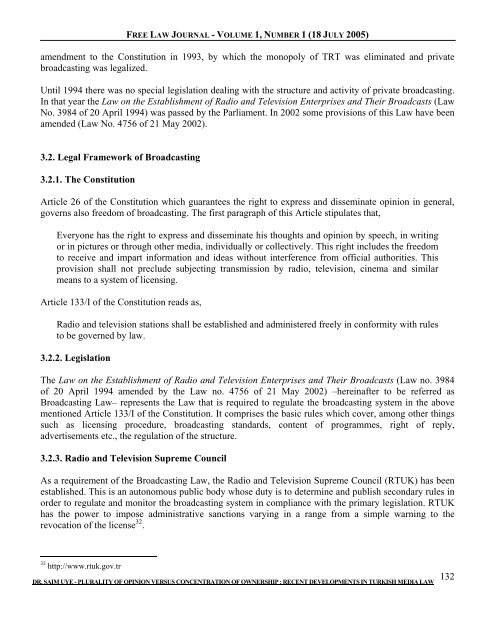Free_Law_Journal-Vol.. - Free World Publishing Inc.
Free_Law_Journal-Vol.. - Free World Publishing Inc.
Free_Law_Journal-Vol.. - Free World Publishing Inc.
You also want an ePaper? Increase the reach of your titles
YUMPU automatically turns print PDFs into web optimized ePapers that Google loves.
FREE LAW JOURNAL - VOLUME 1, NUMBER 1 (18 JULY 2005)<br />
amendment to the Constitution in 1993, by which the monopoly of TRT was eliminated and private<br />
broadcasting was legalized.<br />
Until 1994 there was no special legislation dealing with the structure and activity of private broadcasting.<br />
In that year the <strong>Law</strong> on the Establishment of Radio and Television Enterprises and Their Broadcasts (<strong>Law</strong><br />
No. 3984 of 20 April 1994) was passed by the Parliament. In 2002 some provisions of this <strong>Law</strong> have been<br />
amended (<strong>Law</strong> No. 4756 of 21 May 2002).<br />
3.2. Legal Framework of Broadcasting<br />
3.2.1. The Constitution<br />
Article 26 of the Constitution which guarantees the right to express and disseminate opinion in general,<br />
governs also freedom of broadcasting. The first paragraph of this Article stipulates that,<br />
Everyone has the right to express and disseminate his thoughts and opinion by speech, in writing<br />
or in pictures or through other media, individually or collectively. This right includes the freedom<br />
to receive and impart information and ideas without interference from official authorities. This<br />
provision shall not preclude subjecting transmission by radio, television, cinema and similar<br />
means to a system of licensing.<br />
Article 133/I of the Constitution reads as,<br />
Radio and television stations shall be established and administered freely in conformity with rules<br />
to be governed by law.<br />
3.2.2. Legislation<br />
The <strong>Law</strong> on the Establishment of Radio and Television Enterprises and Their Broadcasts (<strong>Law</strong> no. 3984<br />
of 20 April 1994 amended by the <strong>Law</strong> no. 4756 of 21 May 2002) –hereinafter to be referred as<br />
Broadcasting <strong>Law</strong>– represents the <strong>Law</strong> that is required to regulate the broadcasting system in the above<br />
mentioned Article 133/I of the Constitution. It comprises the basic rules which cover, among other things<br />
such as licensing procedure, broadcasting standards, content of programmes, right of reply,<br />
advertisements etc., the regulation of the structure.<br />
3.2.3. Radio and Television Supreme Council<br />
As a requirement of the Broadcasting <strong>Law</strong>, the Radio and Television Supreme Council (RTUK) has been<br />
established. This is an autonomous public body whose duty is to determine and publish secondary rules in<br />
order to regulate and monitor the broadcasting system in compliance with the primary legislation. RTUK<br />
has the power to impose administrative sanctions varying in a range from a simple warning to the<br />
revocation of the license 32 .<br />
32 http://www.rtuk.gov.tr<br />
DR. SAIM UYE - PLURALITY OF OPINION VERSUS CONCENTRATION OF OWNERSHIP : RECENT DEVELOPMENTS IN TURKISH MEDIA LAW<br />
132
















